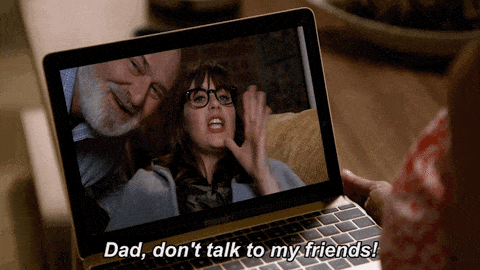Video calls are helping us to stay connected more than ever now, but between bad internet connections, lingering silences and less-than-flattering lighting, they can be a slightly more awkward experience to meeting up face-to-face.
For some people, that’s no big deal, but for others, it can be a panic-inducing ordeal that brings a bout of dread each time a meeting request drops into their inbox.
Unlike regular work meetings, video calls can appear to carry more weight – and the feeling of needing to ‘perform’ in an interesting and error-free way can be overwhelming to someone who already suffers with social anxiety.
The NHS describes social anxiety as a “a long-term and overwhelming fear of social situations”. While you might typically associate this type of mental health issue with crowded parties or big work events, it’s a common problem that can also apply to phone and video calls.
From worrying about doing something embarrassing to finding it difficult to collect your thoughts when others are watching, those who suffer with social anxiety find their phobia of presenting is amplified on video calls, and physical signs include feeling sick, sweating, trembling or a pounding heartbeat.
According to experts though, there are a number of strategies we can use to stop ourselves from feeling triggered by a virtual work meeting or virtual Friday night drinks.
1. Use the Post-It note trick

Dr Penny Pullan, author of Virtual Leadership: Practical strategies for getting the best out of virtual work and virtual teams, asks: “Imagine if you had a mirror facing you in all of your in-person work meetings – wouldn’t it put you off?
“Having your own face visible in video meetings isn’t always helpful, so I’ve found it’s useful to place a Post-It note over your picture on the screen, to cover it up. Without your appearance there to distract you, you can relax into a more natural conversation.
“Some conferencing tools even have an option which does this for you, so make sure to do your research into the features of your software ahead of the call. An IT person from your work could help you to set this up.”
2. Prep yourself
“My top tip for nervous video attendees is to give yourself adequate time to prepare,” says business coach Erica Wolfe-Murray, founder of Lola Media.
“If it’s a new set of clients, make sure to research the other attendees ahead of time, order all of your notes and write down any questions you may want to ask.
Make sure you then have these in easy-to-find places on your desk. It’s the little things that will help you to feel more confident in how you deliver yourself.”
3. Set the scene

“Remember to shut pets, children and partners out of the room if you can, and make them aware of the importance and length of your call.
You’re much more likely to feel confident and assured if you don’t have noises distracting you for the duration,” stresses Wolfe-Murray.
“Think about your background too. I advise you keep it simple and clear, using a plain wall, curtain or backdrop.
If you need to though, use the background filter feature – a handy tool that can block out your background – that’s available on many video conference software.”
4. Just breathe
“A screen full of faces can make us feel like we’re on stage, which spikes the same anxiety we associate with doing a speech,” says Harley Street life coach
Karl Rollison.
“I’ve helped lots of clients to beat their performance fears with simple breathing techniques.
“Before the call, try breathing in for the count of four, pausing, and then breathing out for the count of 12. Repeat this five times to yourself – it works wonders for keeping calm under pressure.”
5. Soft toys can help

“When speaking to others on a video conference, it’s important to look into your camera lens. Unfortunately, this is precisely the opposite of what someone whose anxious about video feels like doing,” says Pullan.
“I find it helps to have some friendly soft toys propped up just behind the camera that you can direct your thoughts and opinions to.
“It might sound like a slightly odd trick, but when speaking to others remotely, directing your gaze away from the rows of staring faces can help you to avoid becoming overwhelmed by fear.
“And if nobody can see it? Then it can be your little secret tool.”
6. Don’t be scared of technical issues

“It’s worth testing your equipment, and the software you’ll be using, ahead of an important work call,” says Rollinson.
“This will allow you to become confident with how everything works, so you can focus entirely on the interview at hand.
“Don’t panic if you have a technical hiccup though. While you should be able to iron these out by testing your equipment ahead of time, occasionally you’ll still run into a error, like patchy internet or a background distraction.
“Instead of beating yourself up, try not to let it affect the call. Just apologise for the interruption and continue with the conversation.”





